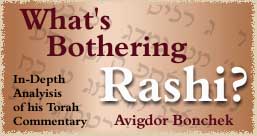

Back to this week's Parsha | Previous Issues
Parashas Noah
Genesis 6:9 "These are the generations of Noah; Noah was a righteous man and perfect in his generations, and Noah walked with G-d." RASHI "In his generations: Rashi: Some of our Rabbis explain it to his credit : [he was righteous even in his generation] certainly if he was in a generation of righteous men he would have been even more righteous. And some explain it to his discredit: In HIS generation he was righteous. But if he had been in the generation of Abraham he wouldn't have been considered anything." Much has been discussed about this comment. Let us state first that the argument is not about the degree of Noah's righteousness. There is no argument about how righteous he was. He was what he was. The question is what the word "in his generations" means. Certainly it is a redundant word - when else would be righteous, if not when he lived ? What then does this word teach us? Was he righteous EVEN in his generation or was he righteous ONLY in his generation? Putting aside the merits of each side, we would ask: Why does Rashi change his language when he presents both views? On the credit side he says : If he lived in a generation of righteous men he would be even more righteous." On the discredit side "if he lived in the generation of Abraham, he wouldn't have been anything." Why the "generation of Abraham" ? Some answer that the next Righteous man after Noah was Abraham. He came after Noah's generations. So the comparison was made with him. I would say that the meaning is this: Noah was Righteous in a particular sense, he was Perfect with G-d. He wasn't a very social fellow, he had little to do with his peers. He wasn't particularly righteous with his fellowman. He didn't try to teach them to improve their ways, as Abraham did. Abraham put himself out for his contemporaries even though they were not righteous individuals. Only by comparing Noah to Abraham can we see what he was lacking in his righteousness. He was lacking the basic element of true righteousness "Love thy neighbor as thyself." Had been in Abraham's generation "he wouldn't have been considered anything" because Abraham's love for mankind would have overshadowed Noah's insular-type righteousness. Or so it seems to me.
Back to this week's Parsha | Previous Issues Permission is granted to redistribute electronically or on paper, provided that this notice is included intact.
For information on subscriptions, archives, and
http://www.shemayisrael.co.il |